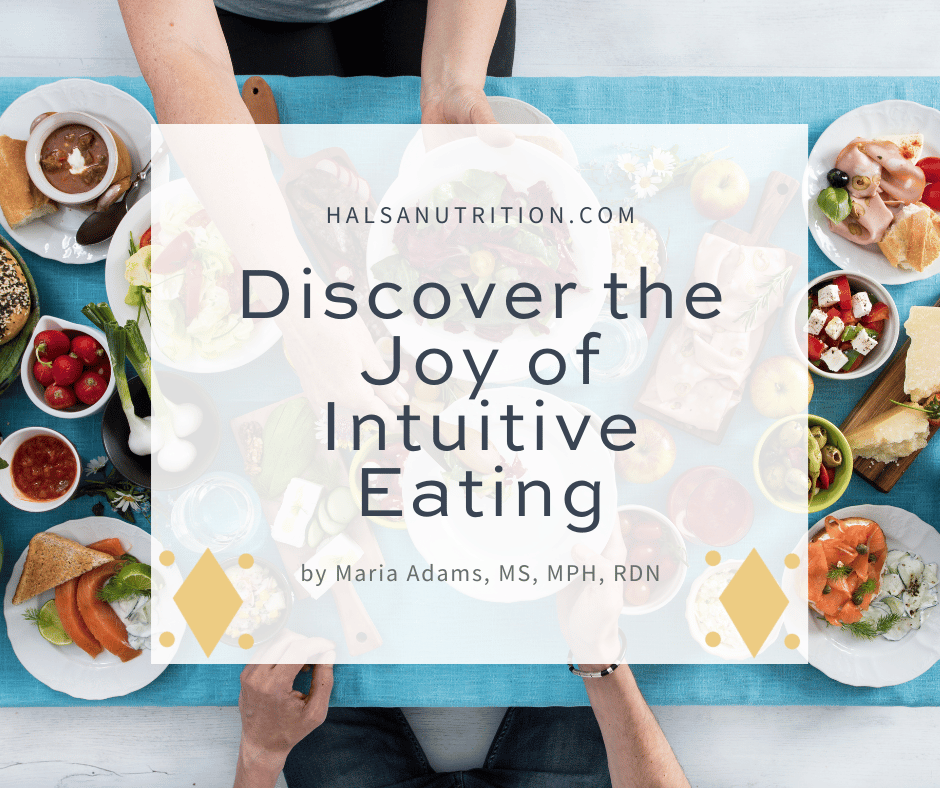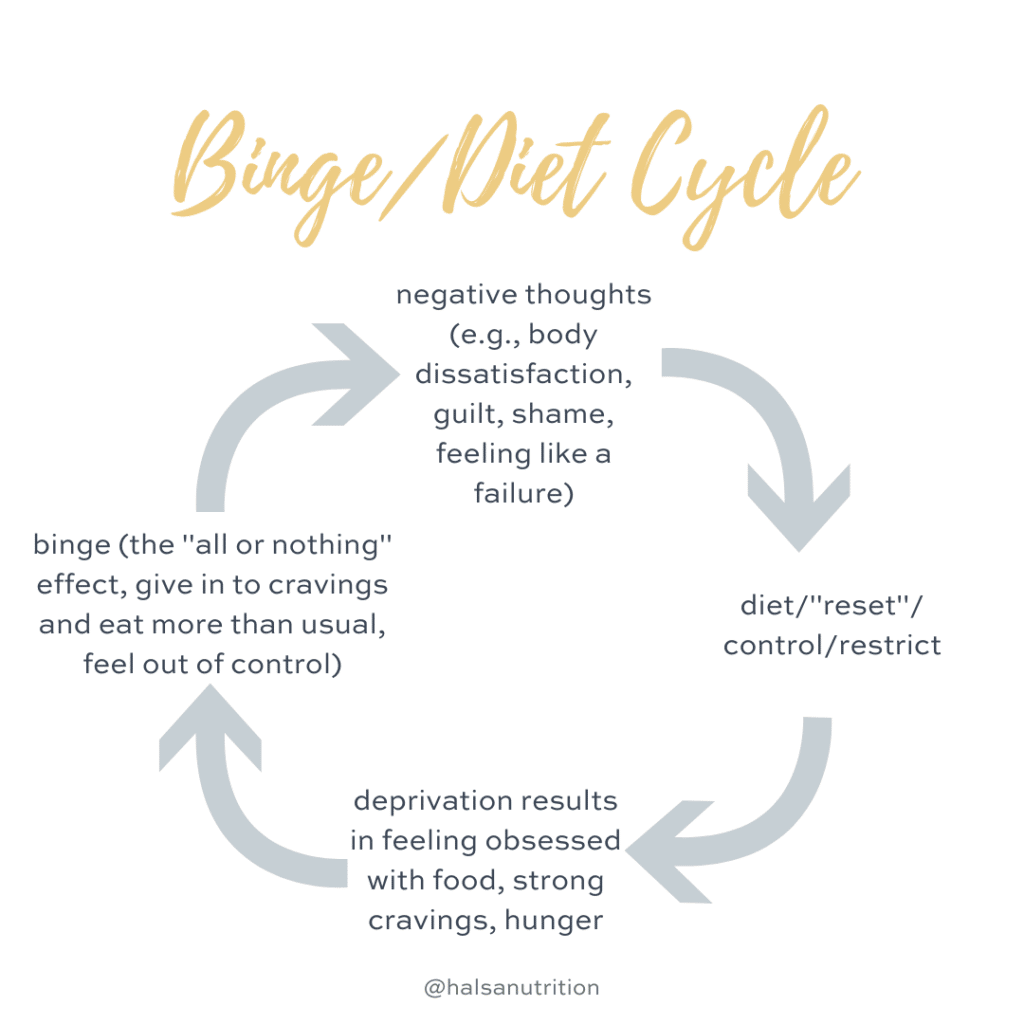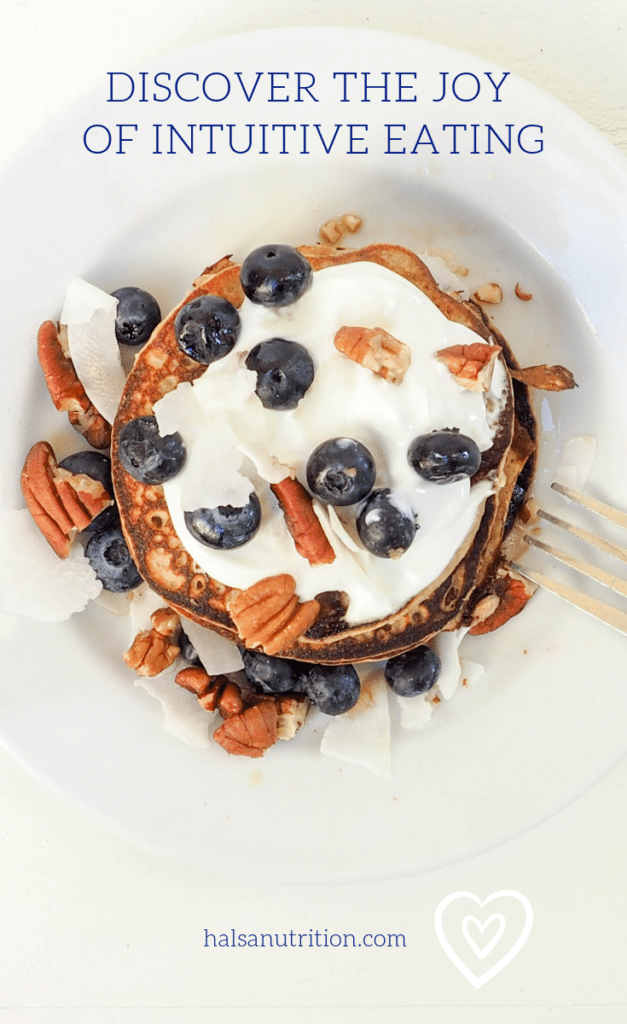
Discover the Joy of Intuitive Eating
What is “intuitive eating” and how can it help you add more joy to your life? Read on to find out.
Estimated reading time: 6 minutes
Imagine eating without rules, restrictions, or judgment. Eating with both pleasure and nourishment in mind (but not so much on your mind that it takes over your mind). That sounds like a breath of fresh air, right?
Is it possible to ditch the restrictions and still be healthy? Won’t that lead to overeating or too much sugar?
Yes, it’s totally possible to eat freely and still be healthy. It’s called intuitive eating (IE) and it’s what we are born to do. Babies and toddlers are naturally intuitive eaters. Some of us maintain it throughout our lives, but most start restricting or judging at one point or another.
What is intuitive eating?
At its essence, IE is a mind-body approach to eating that includes honoring your hunger and fullness levels. *** It’s the opposite of a diet because instead of following rules you are listening to your own intuition. IE promotes a healthy attitude toward food and body image and can help you break the cycle of chronic dieting or “rule-following” and heal your relationship with food.
A No Rules Eating Style
With IE there is no labeling of foods as good or bad, but rather a focus on eating to nourish and honor your body. IE recognizes that there is room for both nourishing foods and “play” foods in your life and that those play foods should be eaten without guilt or judgment.
So rather than measuring out the recommended amount of pasta, for example, an intuitive eater would use their internal cues to determine how much they eat. Some days this may mean two bowls of pasta other days it may be less. Either way, whether it was whole wheat pasta, garbanzo bean pasta, or classic white pasta, they would eat and enjoy it without guilt.
How Intuitive Eating Goes Awry
As children, we may be told that we have to clean our plate. Or maybe we learn that we need to finish our dinner before we can eat dessert. And then when it comes time for dessert we may be told that we can only have one serving. All this usually stems from well-intentioned parenting but doesn’t follow the division of responsibility which states that adults decide what, when, and where to eat, but kids whether or not they will eat it and how much they will eat.
On top of these restrictions, sometime during childhood, we pick up on diet culture. Sadly, a recent report found that almost half of 1st to 3rd-grade girls report wanting to be “thinner.”* By high school, an estimated 50% of girls and 33% of boys are trying to lose weight at any given time.** Diet culture is ingrained in our society so much that dieting is seen as the norm.
Additionally, a new trend has been occurring over the past few decades, focusing on overall diet quality and “clean eating.” I touched upon this obsession with healthy eating and unnecessary restrictions in a previous post: The Problem with Clean Eating.
Whether it’s dieting or clean eating, if one is always thinking about food and weight or health: what to eat, what not to eat, how much to eat, how to burn more calories, feeling guilty about what you ate or didn’t eat, feeling bad about your body size, etc., it’s pretty much guaranteed to snatch joy out of your life. (Not to mention make less room for other more important thoughts and actions.)
Is Intuitive Eating Mindful Eating?
While mindful eating is not the same as intuitive eating, it’s an important component of intuitive eating and can help you distinguish emotional eating from hunger eating. Emotional eating–whether due to stress, boredom, or sadness, is completely normal from time to time. Developing mindfulness can help you recognize when you are eating for emotional reasons versus hunger reasons. Mindfulness can also help you tune into habits such as fast eating as well as thoughts that occur while eating.
How Can a “No Rules” Diet Be Healthy?
You are probably wondering how eating whatever, whenever, and how much you want can be healthy. The thing is, practicing IE doesn’t mean that you don’t care about your health and what you put in your body. Quite the opposite: IE means respecting your body and honoring your health, which means most of the time you probably will choose foods that nourish and in appropriate amounts. But it also means recognizing that it’s ok to not adhere to this all the time. There is no judgment.
How Diets Fail Us

Unlike IE, diets are generally restrictive by nature, and this can lead to a problematic cycle that goes something like this:****
We…
- Start following an overly rigid diet (ignoring our hunger cues and cravings)
- Become preoccupied with food cravings
- Break the diet and give in to our cravings
- Feel failure, shame, and other negative emotions
- Respond to these emotions by overeating or indulging in the food we were trying to avoid (e.g., gluten, sugar, dairy, etc.)
- Feel bad about ourselves again
- Start a new diet plan
- Eventually break the diet again, continuing the cycle
Put simply, dieting can lead to feelings of psychological distress that lead us to feel bad and stray away from the diet even further, making the dieting behaviors ineffective and counterproductive.
What the Research Says
Research already suggests several benefits of intuitive eating, including:
- a healthier diet overall,^
- greater psychological well-being,
- improved eating behaviors,
- healthier blood pressure and cholesterol levels, and
- increased body satisfaction.^^
How Intuitive Eating Can Help You
As you can already see, there are many ways that intuitive eating can help you improve your health and well-being, especially if you struggle with body dissatisfaction, chronic dieting, or emotional eating. In summary, IE can help you:
- Let go of
- rules and restrictions.
- negative feelings or judgments surrounding your food choices.
- perfection.
- Create eating habits that help you thrive.
- Learn
- how your emotions and feelings affect your food intake.
- to distinguish physical hunger from emotional hunger.
- to trust your gut instead of relying on “experts” or diet plans.
- Respect and love your body as it is today.
- Find exercise and movement that you enjoy doing.
- Honor your health; recognize that the big picture of health includes much more than weight.
Discover the Joy of Intuitive Eating Yourself
Ready to ditch the diet or other self-imposed restrictions and “relearn” how to eat intuitively? Learn more about IE–including how exercise and weight fit in– at www.intuitiveeating.org, the website run by Evelyn Tribole and Elyse Resch, who first coined the term Intuitive eating back in 1995. Also, consider working with a Registered Dietitian trained in intuitive eating.
Resources:
More blog posts:
Books I highly recommend:
- Anti Diet, a book by Christy Harrison
- Intuitive Eating, the book by Evelyn Tribole and Elyse Resch
- Intuitive Eating Workbook
Podcasts to listen to:
Sources:
*https://www.nationaleatingdisorders.org/blog/something-needs-improvement-its-not-your-body
***https://www.intuitiveeating.org/what-is-intuitive-eating-tribole/
****https://www.eatingdisorders.org.au/eating-disorders/disordered-eating-a-dieting/why-diets-dont-work
^https://www.ncbi.nlm.nih.gov/pubmed/27798333
^^https://www.sciencedirect.com/science/article/pii/S2212267213018960

Leave a Reply